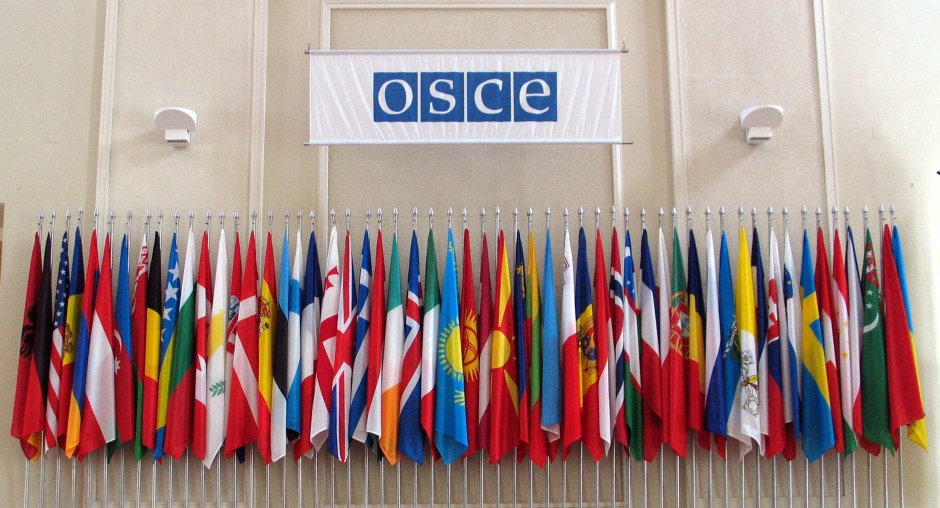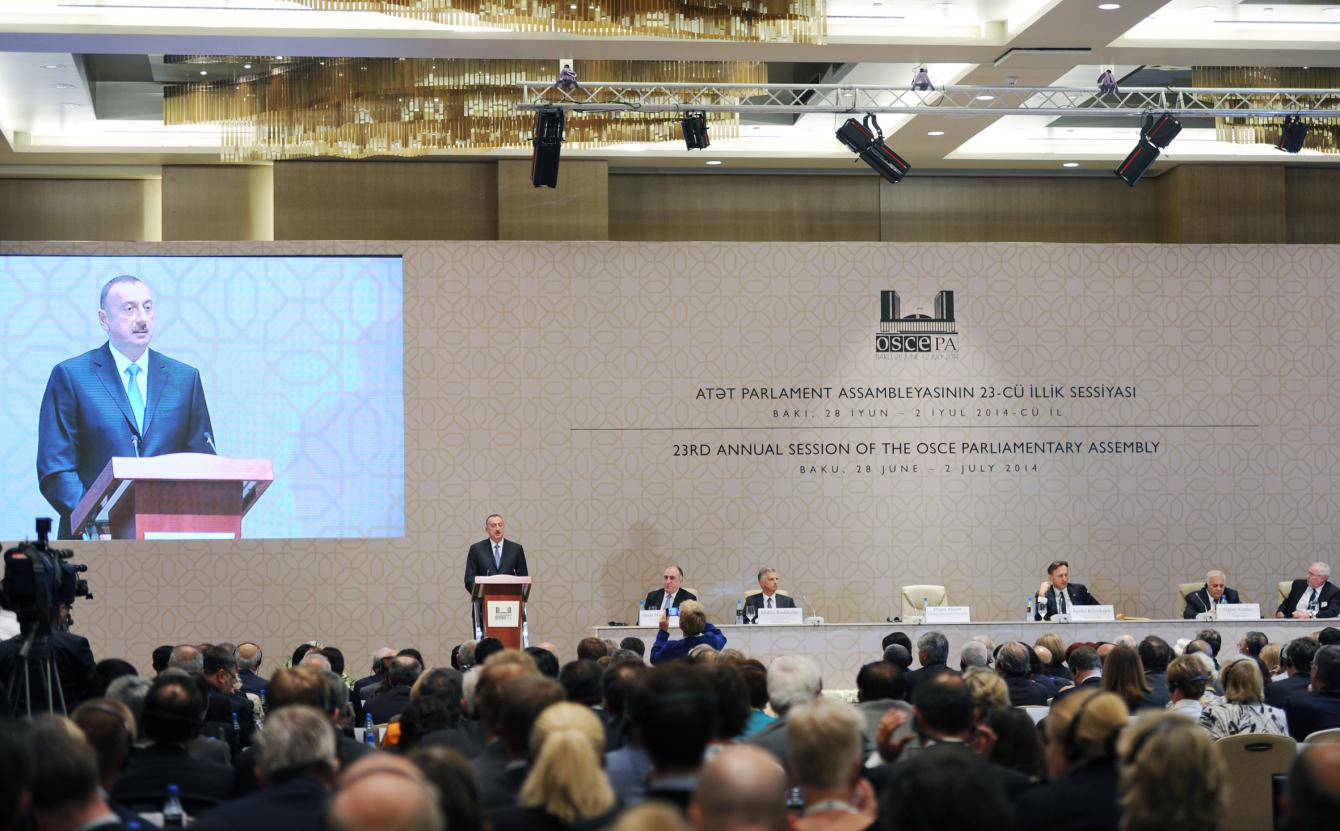AZERBAIJAN — OSCE
Azerbaijan became a member of OSCE in 1992 on January 30. OSCE was the first European Organisation to include Azerbaijan.
After the Republic of Azerbaijan became a full member of the organization, the OSCE summits in Helsinki in 1992, Budapest in 1994, Lisbon in 1996, Istanbul in 1999, and Astana in 2010.

The last summit of OSCE was held in Astana in 2010 on December 1-2. The delegation led by the president of the Republic of Azerbaijan Ilham Aliyev attended the summit. The final declaration adopted at the summit highlighted the importance of resolving conflicts in the OSCE area on the basis of norms and principles enshrined in the UN Charter of international law and Helsinki Final Act.
The Ministerial Council is the second central decision-making and governing body of the Organization after the Summit. Ministerial meetings, as a rule, are convened once a year (excluding the years of the Summit) in the country holding the Chairmanship.
Azerbaijan actively participates in the annual meetings of the OSCE Council of Foreign Ministers and discussions of draft resolutions and documents.
The Permanent Council is the principal decision-making body for regular political consultations and for governing the day-to-day operational work of the OSCE between the meetings of the Ministerial Council. The Permanent Council meetings take place once a week in Vienna.
There are three executive agencies within the OSCE to foster the dialogue and co-operation within and between the participating States and to assist them in fulfilling their commitments in this area: the Office for Democratic Institutions and Human Rights (ODIHR), the OSCE Representative on Freedom of the Media (RFoM) and the High Commissioner on National Minorities (HCNM).
The ODIHR is headquartered in Warsaw and has a mandate to assist the participating States in fulfilling their Human Dimension Commitments (HDCs).
Azerbaijan has been cooperating with the OSCE Office for Democratic Institutions and Human Rights (ODIHR) since 1998 and has implemented a number of projects in the areas of democratisation, rule of law, improvement of legislation, especially election legislation, migration, gender equality and others. The ODIHR participated in the observation of the presidential, parliamentary and municipal elections in Azerbaijan.
The position of the OSCE Representative on Freedom of the Media (RFoM) was established by a decision of the Permanent Council of the Organisation dated the 5th of November 1997. The mandate of the Representative includes observing the media processes in the OSCE participating States and assisting the participating States in fulfilling their commitments in this area. The Representative’s office is located in Vienna.
The Government of Azerbaijan is cooperating with the RFoM on issues within its mandate. Examples of cooperation with this institution include training for Azerbaijani journalists and press officers of various organisations, in particular the improvement of Azerbaijan’s media legislation and its legal expertise.
The post of OSCE High Commissioner on National Minorities (HCNM) was established by the relevant decision of the 1992 Helsinki Summit of the CSCE. The High Commissioner’s mandate covers early warning and early action to prevent tension from national minorities in OSCE participating States. The High Commissioner’s office is located in The Hague.
Since becoming a full member of the OSCE, Azerbaijan has established relationships with the Office of the OSCE High Commissioner on National Minorities. Azerbaijan cooperates in the field of protection of the rights of national minorities, sharing best practices and norm-setting in such important areas as their full integration into the public life of the states of which they are citizens.
The OSCE Secretary-General has the function of coordinating the daily activities of the organization’s Secretariat and executive bodies. It is appointed for a period of three years by the decision of the Council of ministers.
On the 12th of September 2018, OSCE Secretary General Thomas Greminger visited our country. During the visit, the Secretary-General was received by the President of the Republic of Azerbaijan, and meetings were held with the Minister of Foreign Affairs of the Republic of Azerbaijan, the management of the Baku International Seaport and other officials. The sides exchanged views on practical aspects of Azerbaijan-OSCE cooperation.
The Parliamentary Assembly, composed of 323 parliamentarians from the OSCE participating States, aims to promote dialogue at the parliamentary level as an autonomous body of the OSCE and is of a consultative nature. The delegation of the Milli Majlis of the Republic of Azerbaijan is represented in the work of the OSCE PA by a total of 6 deputies, 3 of whom are key persons.

Close co-operation has been established between Azerbaijan and the OSCE PA. The 2014 Annual Session of the OSCE PA was held in Baku. At the annual sessions of the organisation held in different years, various resolutions were adopted at the initiative of the Azerbaijani side. At present, an unofficial group “Support to the Silk Road” established at the initiative of the Azerbaijani side operates within the organisation.
The OSCE is one of the organisations with which Azerbaijan co-operates in the promotion and protection of human rights. On the 26th of November 1998, a Memorandum of Understanding (MoU) was signed by and between the Government of Azerbaijan and the OSCE Office for Democratic Institutions and Human Rights (ODIHR). The annex to the memorandum envisages close cooperation in the implementation of democratic reforms in the field of human rights in the country.
With the support of the OSCE Office for Democratic Institutions and Human Rights and the Baku Office, important projects have been implemented and measures were taken in the areas of civil society development in Azerbaijan, promotion of freedom of thought and expression, combating gender inequality, and violence against women, torture prevention, human rights education, and free and fair elections.
Azerbaijani officials regularly attend the OSCE Annual Meetings on the Human Dimension. As a rule, the meeting is attended by the representatives of the Ministry of Foreign Affairs, the Central Election Commission, the Ministry of Justice, the Ministry of Internal Affairs, the State Committee for Refugees and Internally Displaced Persons, the Commissioner for Human Rights (Ombudsman), and the Council for State Support to Non-Governmental Organisations under the auspices of the President of Azerbaijan.
In 2020, Azerbaijan continued its effective cooperation with the OSCE and the OSCE / ODIHR in the field of human rights. Various events (seminars, training, conferences, etc.) were organised as part of this cooperation. Most of the events were held online due to the COVID pandemic. During the year, participation of the representatives of various government agencies at international events, as well as in monitoring election processes and election observation has been ensured.
Azerbaijan has an Election Code developed in cooperation with leading international organisations to ensure that elections are conducted in accordance with international standards. The Venice Commission of the Council of Europe, the OSCE / ODIHR and the International Foundation for Electoral Systems (IFES) worked closely together to develop the document. As a result of cooperation with these organisations since mid-2002, almost all of the recommendations proposed by these organisations on the draft Election Code have been included in the draft Election Code. In December 2002, the draft Election Code was discussed at roundtables organised by the OSCE / ODIHR with the participation of representatives of the Government of Azerbaijan, the opposition, international organisations and the public. The Election Code was adopted in May 2003 and entered into force on the day it was signed by the President.
At the official invitation of the Government of the Republic of Azerbaijan, the ODIHR sent an Election Observation Mission (EOM) for the early presidential elections held on the 11th of April 2018. The ODIHR EOC consisted of 10 international experts based in Baku. In addition, the ODIHR has requested that OSCE participating States deploy more than 30 long-term and 280 short-term observers. Observers monitored candidate registration, campaign activities, the work of the election administration and relevant government bodies, election legislation and its implementation, the media environment, and election dispute resolution.
At the official invitation of the Government of the Republic of Azerbaijan, the ODIHR established the EOC to observe the early parliamentary elections held in our country on the 9th of February 2020. The main staff of the EOC in Baku consisted of 12 people. The ODIHR involved 271 long-term and short-term observers to observe the elections. Observers monitored the entire election process. The parliamentary elections were an important milestone in the reforms carried out by the Government of Azerbaijan and an important step for the democratic development of the country.
In 2021, the OSCE chairman-in-office visited Azerbaijan on March 14-15. During the meetings held within the framework of the visit, discussions were held on the situation in the region after the settlement of the Armenia-Azerbaijan Nagorno-Karabakh conflict, the role of OSCE in the processes of post-conflict restoration, reconstruction, and re-integration, as well as the strengthening of practical cooperation between Azerbaijan and OSCE.
In 2021, on May 25, the ministers of foreign affairs of the Republic of Azerbaijan made a speech at the Special Meeting of the Permanent Council and drew attention to the vision of the Republic of Azerbaijan on restoration, reconstruction, and re-integration after the end of the Armenia-Azerbaijan Nagorno-Karabakh conflict.



